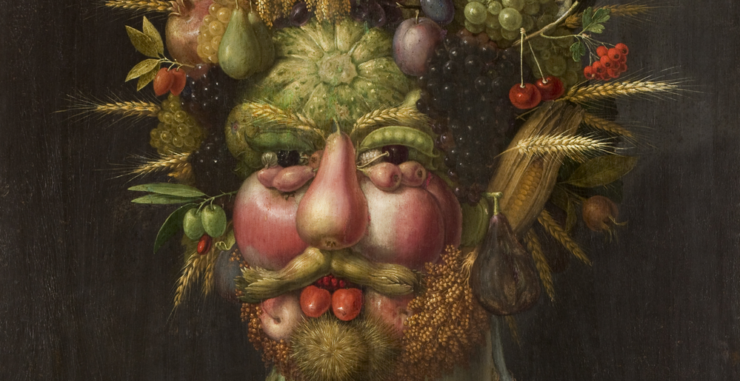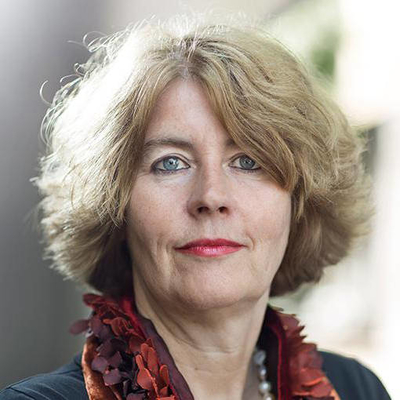
This truism is often restated in writings about food. It is a quote from Ludwig Feuerbach (1804-1872), who has been much ridiculed for making this statement –at the time he wrote it in 1850, and after – in an essay titled “Die Naturwissenschaft und die Revolution” (“The Natural Sciences and the Revolution”).[1] Until recently I saw Feuerbach as an important yet somewhat liminal figure between the German idealists and the historical materialism developed by Marx and Engels. It was only in reading about religion and food that I realized Feuerbach’s importance as an genuine material thinker worth being re-membered. Seeking to flesh out our new thematic focus on food in the Religious Matters project, I find it productive to engage with his materialist philosophy that takes the stomach seriously.
In his publication Das Wesen des Christentums (1841), Feuerbach proposed a human-centered rather than God-centered, and thus anthropological rather than theological, understanding of religion according to which God was a mirror of the human (“Gott ist der Spiegel des Menschen”). He launched an understanding of God as a creation of man. This did not mean, as many assume today, that Feuerbach saw God simply as a projection of human needs; the point is rather that the study of religion is able to lay bare human needs, affects, and perceptions. In this work he thought about the Eucharist as a sensorial religious act, through which food was valued as divine and sacralized. The host becomes the flesh of Christ in the imagination, but the host or bread, once eaten, is transformed into human flesh. So, in a way, the Eucharist affirms the truth of chemistry, in that the bread humans eat becomes their flesh (see the essay by John Hymers who fleshes this out in great detail).[2]
In his essay “Die Naturwissenschaft und die Revolution” Feuerbach notes that the Prussian state curtailed and censored critical philosophy (especially with regard to religion and politics), while the natural sciences were promoted. And yet, according to Feuerbach the latter have a strong revolutionary potential, as was shown exemplarily in Jakob Moleschott’s book Lehre der Nahrungsmittel für das Volk (1853). Moleschott (1822-1893), a materialist philosopher and physicist, born in the Netherlands and trained in Germany, where he worked before becoming a professor in Switzerland and later on in Italy (Turin and Rome), is still remembered for the poignant one-liner “Ohne Phosphor kein Gedanke” (“Without phosphor no thought”). Published at the height of the so-called “Materialismusstreit” (struggle over materialism) in mid-19th century Germany, his work sought to communicate a societal reform program based on insights from the natural sciences.
Stimulated by Moleschott, Feuerbach developed a materialist philosophy that takes the stomach as its anchor point. His short, provocative essay contains intriguing polemics that can serve to flesh out contemporary approaches to food as religious matter par excellence. For instance:
”How much have the philosophers puzzled their heads over the question about the relation between the body and the soul! Now we know on scientific grounds what the people long knew from experience, that eating and drinking hold the body and the soul together, that hence the relation looked for is food. How has one fought over native ideas or ideas coming from outside, and how contemptuous has one looked down at those who derive the origin of ideas from the senses”[3] (this and subsequent translations by me).
And:
”How did not the concept of substance vex philosophy? What is it? Me or non-me, mind or nature, or the unity of both? Yes, the unity. But what does this say? The food only is the substance; the food is the identity of mind and nature. Where there is no fat, there is no meat; but where there is no fat, there is no brain, no spirit: and the fat comes only from food. The food is the Spinozistic Hen kaì pân, the all-embracing, the essence of the beings. Everything depends on eating and drinking (emphasis in the Original)”.[4]
In his essay he drew a difference between an “old philosophy” that “started with thought” and left people without bread, and a “new philosophy” that “begins with food and eating.”[5] He pursued and refined the latter in subsequent works.[6] Finally, towards the end of his essay he makes the well-known statement which prompted this blog:
The food becomes blood, the blood becomes heart and brain, and thoughts and ethos. Human food is the foundation of human education and ethos. If you want to improve the people, give them better food instead of declamations against sin. The human being is what he/she eats. Who enjoys only vegetable-diet is also only a vegetating being, has no energy (italics mine).[7]
My concern with this blog is to contextualize this statement by literally situating it in Feuerbach’s polemical essay, which is situated in the political struggles about nutrition and the role of the body and materiality in scholarship in mid-nineteenth century Germany. It was a time in which ordinary people suffered from hunger and malnutrition, and endured a strongly potato-based diet (which is, I think, the target of the last sentence in the quote). Facing concerns about a range of issues from eating disorders to the challenge of global food production and climate change, in our time there are many differences, but food still is a major societal, political, economic, cultural and religious issue. How can scholars of religion, and in the humanities and social sciences at large, theorize food as basic to human existence and identity, and relate to such huge issues? How to understand the role and place of food in ways of being in the world, and its power to unite and divide in plural societies? Of course, reading Feuerbach cannot provide direct answers to such questions, but his grounded, material approach is stimulating. Presently his work is rediscovered by several scholars, including the American Philosopher John Hymes who regards Feuerbach as prefiguring Merleau-Ponty’s phenomenology by thinking human’s relation to the world through food (see note 2), and the German philosopher and historian Harald Lemke[8], who appraises Feuerbach for developing a “gastrosophic anthropology of existence.” I take these gastro-philosophical openings as appetizing “food for thought” in our future explorations of the food/religion nexus.
Notes
[3] Orig: Was haben sich nicht sonst die Philosophen den Kopf zerbrochen mit der Frage von dem Bande zwischen dem Leib und der Seele! Jetzt wissen wir aus wissenschaftlichen Gründen, was längst das Volk aus der Erfahrung wusste, dass Essen und Trinken Leib und Seele zusammenhält, dass das gesuchte Band also die Nahrung ist. Wie hat man sich nicht sonst über eingeborene oder von aussen gekommene Ideen gezankt und wie verächtlich auf die herabgeblickt, welche den Ursprung der Ideen aus den Sinnen ableiteten!“
[4] Wie hat nicht der Begriff der Substanz die Philosophie vexirt! Was ist sie? Ich oder Nicht-Ich, Geist oder Natur, oder die Einheit von beiden? Ja, die Einheit. Aber was ist denn damit gesagt? Die Nahrung nur ist die Substanz; die Nahrung die Identität von Geist und Natur. Wo kein Fett, ist kein Fleisch; aber wo kein Fett, da ist auch kein Hirn, kein Geist: und das Fett kommt nur aus der Nahrung. Die Nahrung ist das Spinozistische Hen kaì pân, das Allesumfassende, das Wesen der Wesen. Alles hängt vom Essen und Trinken ab.
[5] Orig.: „Die alte Philosophie begann mit dem Denken, sie »wusste nur die Geister zu vergnügen und liess darum die Menschen ohne Brod«; die neue beginnt mit Essen und Trinken.“
[6] For instance in an essay titled “Das Geheimnis des Opfers oder der Mensch ist was er isst” (1862). See here the translation and introduction by Cyril Levitt: link.
[7] „Die Speisen werden zu Blut, das Blut zu Herz und Hirn, zu Gedanken und Gesinnungsstoff. Menschliche Kost ist die Grundlage menschlicher Bildung und Gesinnung. Wollt ihr das Volk bessern, so gebt ihm statt Deklamationen gegen die Sünde bessere Speisen. Der Mensch ist was er isst. Wer nur Pflanzenkost geniesst, ist auch nur ein vegetirendes Wesen, hat keine Thatkraft.“
[8] https://www.haraldlemke.de.
Cover image: Giuseppe Arcimboldo. source.

